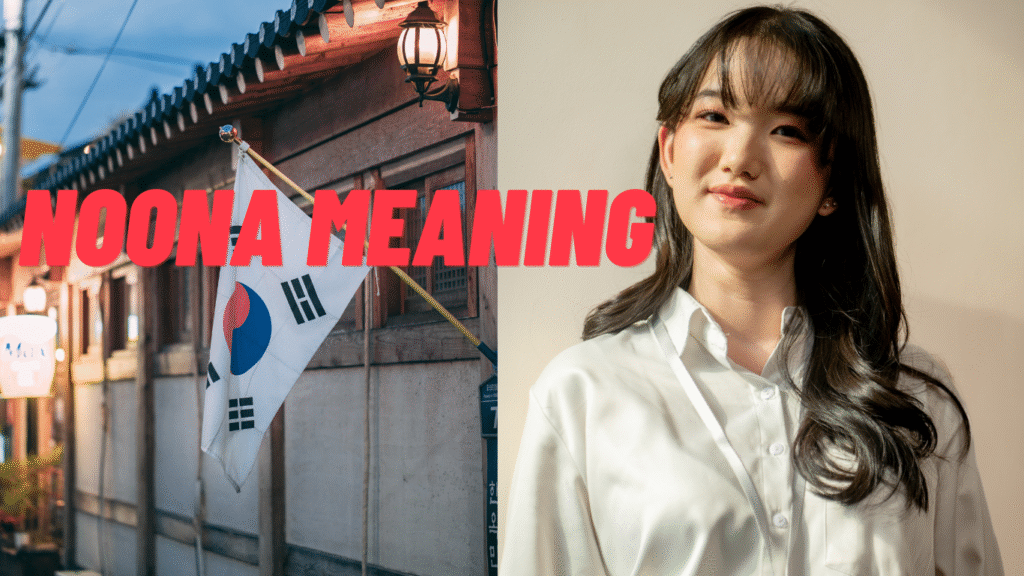If you’re a fan of Korean culture, K-Dramas, or K-Pop, you’ve probably heard the term “noona.” But what does noona mean exactly? This word is more than just a term for “older sister.” In fact, it reveals a lot about Korean social hierarchy, gender roles, and how respect and affection are expressed through language.
Profile Biographie Table
| Term | Description |
| Word | Noona (누나) |
| Meaning | Older sister (used by younger males) |
| Language | Korean |
| Used by | Younger males addressing older females (siblings, friends, or romantic) |
| Pronunciation | /nuː-nɑː/ (nu-nah) |
| Cultural Meaning | Respectful and affectionate term in informal settings |
| Context | Korean families, friendships, and romantic dynamics |
Understanding What Does Noona Mean in Korean
To answer the question “what does noona mean,” it’s important to look at both literal and cultural aspects. Literally, “noona” (누나) means older sister, but it’s used only by males when referring to older females they’re close to. This includes biological sisters, female friends, colleagues, and even romantic interests.
Cultural Use: More Than Just “Sister”
In Korea, age and hierarchy matter a lot. So, the word “noona” is a way for younger males to show respect and closeness to older females. If a man is close to a slightly older female friend or coworker, he might refer to her as noona.
This makes the question what does noona mean even more layered—it’s not just about age, but also about relationship dynamics.
Common Situations Where “Noona” Is Used
Here are typical examples where “noona” would be used:
- A boy talking to his older sister
- A younger male addressing an older female friend
- A younger boyfriend calling his older girlfriend “noona”
In all these situations, the word shows a blend of affection, comfort, and respect.
What Does Noona Mean in K-Dramas and K-Pop?
If you watch K-Dramas or follow K-Pop, you’ll often hear the term “noona” used in emotional or romantic scenes. Songs like SHINee’s “Noona Neomu Yeppeo” translate to “Older Girl, You’re So Pretty,” creating a sweet romantic angle.
So, when fans ask what does noona mean, they often think of the romantic tone seen in dramas or music videos.
Noona vs. Other Korean Titles
Korean has several relational terms that change depending on age and gender:
| Korean Term | Who Uses It | Meaning |
| Noona | Male | Older female |
| Unnie | Female | Older female |
| Oppa | Female | Older male |
| Hyung | Male | Older male |
Understanding these helps explain what does noona mean in relation to other terms, especially in conversations that express respect or intimacy.
Is It Always Okay to Use Noona?
It’s essential to use “noona” appropriately. If you’re learning Korean or interacting with Korean speakers, use it only if you are a younger male speaking to an older female you’re friendly with. Avoid it in professional or formal settings unless you’re certain it’s acceptable.
If you’re still wondering what does noona mean in daily conversations, think of it as a respectful but casual term—something like “big sis,” but culturally richer.
Pronouncing Noona Correctly
“Noona” is pronounced /nuː-nɑː/ or like “new-nah.” The emphasis is soft and often affectionate, especially when used in personal contexts like family or dating.
Why “What Does Noona Mean” Matters in Language Learning
Learning phrases like “noona” helps you connect deeper with Korean language and culture. It teaches you how language in Korea isn’t just about grammar—it’s about social respect, emotional tones, and roles within a group.
So when you ask, what does noona mean, you’re really exploring a core value of Korean society: honoring relationships.
Conclusion
To wrap it up, what does noona mean is more than a question—it’s a peek into Korean values. It means “older sister,” but used only by younger males for older females they’re close to. Whether used affectionately or romantically, the term carries emotional weight and social meaning in every syllable.
Read more: Darry Ring UK: The Ultimate Guide to the One-Time Purchase Engagement Ring Brand
FAQs About What Does Noona Mean
It’s a respectful term used by younger males to refer to older females, usually sisters or close female friends.
No, females use “unnie” to refer to older women. “Noona” is used only by males.
Yes, especially in K-Dramas and real life, younger men often call their older girlfriends or crushes “noona.”
Only use “noona” if you’re speaking Korean and have a close relationship with an older female. When in doubt, ask if it’s okay.
“Noona” is for younger males to older females. “Unnie” is used by females for older females, while “oppa” is used by females for older males.
